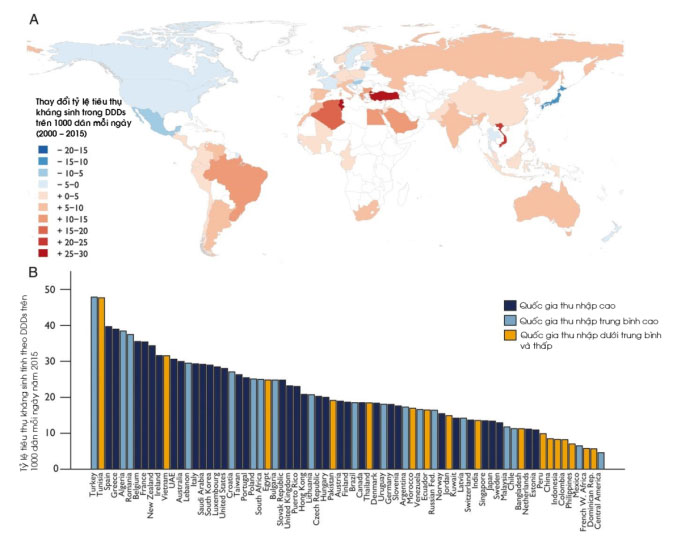Diarrhea is one of the common side effects of antibiotic use, which can lead to gastrointestinal disorders.
Antibiotic Abuse and Its Consequences
The use of antibiotics is likened to a double-edged sword. While they are effective in treating bacterial infections, antibiotics can also cause numerous side effects, the most common being disturbances in the gut microbiota, manifesting as digestive issues such as abdominal pain, nausea, and diarrhea. Antibiotic-associated diarrhea is an acute form of diarrhea that can occur in 5-30% of patients, with the incidence increasing as the spectrum of antibiotics broadens.
Children are more susceptible to diarrhea when taking antibiotics than adults due to their underdeveloped digestive systems. Statistics show that in Vietnam, one in five children using antibiotics experiences diarrhea (a rate of 20%).

Irresponsible use of antibiotics can lead to serious consequences. (Photo: Shutterstock).
There are several mechanisms by which antibiotics can cause diarrhea. A few antibiotics increase intestinal motility, causing undigested food and fluids to be rapidly pushed from the intestines to the anus without being absorbed, resulting in mild diarrhea. Meanwhile, most antibiotics affect the bacteria that disrupt the gut microbiota, leading to diarrhea. Some types, particularly the combination of amoxicillin and clavulanic acid, can cause more severe diarrhea compared to other groups.
The gut microbiota is closely linked to the body’s immune system, helping to maintain a barrier against disease risks. Therefore, when the gut microbiota is disrupted by antibiotics, the body’s resistance also diminishes. This is why excessive antibiotic use can make the body more susceptible to bacterial infections.
Arbitrary use of antibiotics can also lead to various other side effects such as allergies, liver and kidney toxicity, and anaphylactic shock, which can be life-threatening. In the long term, abuse can lead to antibiotic resistance, limiting treatment effectiveness, reducing the bacteria-killing power of the drugs, worsening conditions, and potentially leading to death.
Most types of antibiotics can cause diarrhea, but some are more likely to do so than others, such as cephalosporins, clindamycin, and penicillin.
How Do Antibiotics Affect the Gut Microbiota?
The human gut microbiota consists not only of beneficial and harmful bacteria but also includes viruses, fungi, and parasites that naturally reside in the body.
Typically, gut microorganisms exist in a certain balance. When influenced by factors such as antibiotic use, dietary changes, or illness, this existing balance can shift, reducing the diversity of bacterial strains, leading to a condition known as dysbiosis. Some studies indicate that disturbances in the gut microbiota caused by antibiotics can persist for up to six months after discontinuation of the antibiotics.

Dysbiosis caused by antibiotics can lead to many long-term health issues. (Photo: Shutterstock)
Abusive and prolonged use of antibiotics can prevent the gut microbiota from recovering, leading to chronic dysbiosis that is difficult to reverse. This can contribute to the development of gastrointestinal disorders such as Irritable Bowel Syndrome (IBS) or Inflammatory Bowel Disease (IBD), as well as systemic conditions like obesity, type 2 diabetes, metabolic disorders, and neurodegenerative diseases such as Alzheimer’s. Children may experience asthma, allergies, and autoimmune diseases. These conditions often persist throughout life, incurring high treatment costs and severely impacting patients’ quality of life.

Vietnam is among the countries with the highest rates of antibiotic resistance. (Photo: Proceedings of the National Academy of Sciences).
The World Health Organization (WHO) classifies Vietnam as one of the countries with the highest rates of antibiotic resistance in the world. The Antibiotic Use Map 2015 by IMS Health also shows that Vietnam is among the countries with high antibiotic consumption.
While many developed countries still effectively use first-generation antibiotics, Vietnam has to resort to third and fourth-generation antibiotics. More concerning, some superbugs resistant to all types of antibiotics have emerged in our country, with the most common being gram-negative intestinal bacteria.


















































